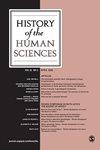多样性的道德经济:多样性的认识价值如何转变现代晚期的知识文化
IF 0.5
2区 历史学
Q2 HISTORY & PHILOSOPHY OF SCIENCE
引用次数: 0
摘要
随着多样性正在成为晚期现代社会的首要价值观之一,我们很可能正在见证知识历史上的一个决定性事件。我们寻求保护和促进生物多样性、神经多样性、种族多样性、民族多样性、性别多样性、语言多样性、文化多样性和观点多样性。视角多样性已经成为其他形式的多样性必须经过的必经之路,从而成为认识论上的结果。本文考察了观点多样性和教育多样性这两种多样性是如何改变科学道德经济的。两者的目标都是在一个给定的主题上增加不同的观点,但它们的政治潜台词却明显不同。1978年,美国最高法院做出了一项裁决,允许大学在录取时考虑种族因素,以使所有学生群体更加多样化的教育效益为依据,从而促进社会正义。相比之下,观点多样性的支持者的目标是改革科学知识的生产和分配,而不是在不同的社会群体之间重新分配地位和权力。我们通过分析社会心理学家之间的争论来研究观点多样性的政治认识论。在2010年代的美国文化战争中,社会心理学家争论如何在一个被认为缺乏政治多样性的科学领域控制他们的政治偏见。这场科学争议催生了异端学院(Heterodox Academy),这是一个促进高等教育观点多样性的激进组织。通过联系和比较观点和教育多样性,我们澄清了以美国为中心的道德多样性经济在认识上的利害关系。本文章由计算机程序翻译,如有差异,请以英文原文为准。
The moral economy of diversity: How the epistemic value of diversity transforms late modern knowledge cultures
We may well be witnessing a decisive event in the history of knowledge as diversity is becoming one of the premier values of late modern societies. We seek to preserve and foster biodiversity, neurodiversity, racial diversity, ethnic diversity, gender diversity, linguistic diversity, cultural diversity, and perspectival diversity. Perspectival diversity has become the passage point through which other forms of diversity must pass to become epistemically consequential. This article examines how two of its varieties, viewpoint diversity and educational diversity, have come to transform the moral economy of science. Both aim at multiplying perspectives on a given subject, but their political subtexts differ markedly. The valorization of educational diversity followed a US Supreme Court decision in 1978 that enabled universities to advance social justice, if they justified race-conscious admissions in terms of the pedagogic benefits of a more diverse student body for all. By contrast, the proponents of viewpoint diversity aim at the reform of scientific knowledge production and distribution rather than the reallocation of status and power among different social groups. We examine the political epistemology of viewpoint diversity by analyzing a controversy between social psychologists who, amid the American culture wars of the 2010s, debated how to rein in their political biases in a scientific field supposedly lacking political diversity. Out of this scientific controversy grew Heterodox Academy, an activist organization promoting viewpoint diversity in higher education. By relating and comparing viewpoint and educational diversity, we clarify what is at stake epistemically in the US-centric moral economy of diversity.
求助全文
通过发布文献求助,成功后即可免费获取论文全文。
去求助
来源期刊

History of the Human Sciences
综合性期刊-科学史与科学哲学
CiteScore
1.60
自引率
11.10%
发文量
31
审稿时长
>12 weeks
期刊介绍:
History of the Human Sciences aims to expand our understanding of the human world through a broad interdisciplinary approach. The journal will bring you critical articles from sociology, psychology, anthropology and politics, and link their interests with those of philosophy, literary criticism, art history, linguistics, psychoanalysis, aesthetics and law.
 求助内容:
求助内容: 应助结果提醒方式:
应助结果提醒方式:


